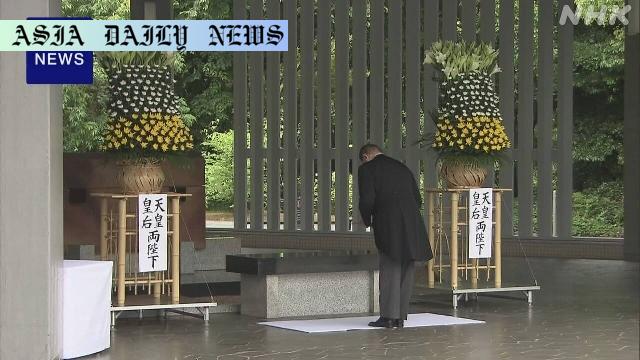Remains of Japanese war dead laid to rest at national cemetery
The remains of 368 unidentified WWII war dead were interred in Tokyo.
These remains originate from the South Pacific and other battle sites.
Japan’s government is working to recover the 1.12 million war dead still unrecovered.

Honoring Those Who Sacrificed: The Chidorigafuchi Ceremony
In a solemn ceremony held on Monday, the remains of 368 unidentified Japanese nationals who perished during World War II were finally laid to rest at the Chidorigafuchi National Cemetery in central Tokyo. This special event was attended by over 600 participants, including Crown Prince and Princess Akishino, representatives of bereaved families, and Welfare Minister Fukuoka Takamaro. For many, the ceremony served as a bittersweet reminder of past sufferings and current efforts to honor and recover the war dead.
The remains, recovered from former battlegrounds such as the Bismarck Archipelago in the South Pacific, are part of Japan’s painstaking ongoing efforts to retrieve and honor those lost in the global conflict of over 80 years ago. To date, more than 371,000 unidentified Japanese war dead have been interred at the cemetery, serving as a sacred space for mourning and memory.
Japan’s Commitment to Recovery and National Remembrance
As Japan marks 80 years since the conclusion of World War II, the government has pledged to accelerate efforts in recovering the remains of approximately 1.12 million Japanese war dead still unrecovered on battlefields both within and beyond Japan’s borders. Welfare Minister Fukuoka Takamaro assured participants at the ceremony that the government would do everything in its power to reunite families with the remains of their loved ones.
For some families, these efforts carry heavy emotional weight. One 83-year-old woman, whose father served in the Imperial Japanese Navy, shared her dream to embrace his remains, emphasizing the deep yearning of many families to bring closure and peace to chapters long left unanswered by history. Such stories underscore the importance of this mission as not merely civic or bureaucratic but deeply human and personal.
Implications of Commemorations and Historical Reflections
The act of laying unidentified war dead to rest resonates far beyond national borders. It reflects a universal recognition of the horrors of war and a shared commitment to honoring those who have been lost. In particular, for Japan, such ceremonies are a poignant reminder of a painful chapter in the nation’s history. Efforts to recover and inter the remains of soldiers underline Japan’s dedication to peace and acknowledgment of its wartime past.
These commemorations also signify an ongoing narrative of healing. They invite present generations to reflect on the cost of war and take lessons from history that resonate even today. Such reflections gain importance as geopolitical tensions and conflicts appear once again on the global stage, reminding all nations of the historical consequences of war.
Looking Forward to Continued Efforts and Global Lessons
While the solemn ceremony for the 368 war dead marks a significant moment of remembrance, the vast task ahead remains daunting. The Japanese government’s vigorous pursuit of recovery efforts demonstrates its commitment to resolving what remains an enduring issue for many families. International collaboration may become pivotal in these efforts, with many remains likely in locations beyond Japan’s control.
These efforts also hold relevance for other nations that experienced major loss during wars. By fostering collective memories and national reconciliation through similar initiatives, the world can continue to heal and learn from its shared past.
Commentary
The Importance of Honoring the Past
Remembering those who gave their lives during times of conflict is more than an act of tribute—it is a necessary step in fostering peace and understanding. The recent interment ceremony at Chidorigafuchi National Cemetery stands as a powerful reminder of the sacrifices made by many, often in unforgiving and harsh conditions.
This moment resonates profoundly for those with personal ties to the events of World War II and evokes a universal sense of loss and respect. It brings to light the shared humanity that persists despite the divisions caused by war. For nations like Japan, acknowledging and honoring these sacrifices is also a necessary part of historical responsibility and introspection.
The Emotional Undertones of Closure and Healing
The journey to bring the remains back to their homeland is not merely a logistical operation—it is a deeply emotional endeavor. Families who have waited decades, often without answers, deserve closure and the opportunity to mourn properly. For individuals like the 83-year-old woman in the story, the chance to finally honor loved ones lost is both deeply personal and transformative.
We should never underestimate the power of such gestures, no matter how small. They serve as a bridge between the past and present, allowing people to reconcile with history and carry forward its lessons to build a better future.
Acknowledging the Global Context
This effort by Japan also holds significance on the global stage. By recovering the remains of its fallen soldiers, Japan emphasizes values of respect, dignity, and reconciliation that are universally important. Other nations could look to this effort as an example of how to respect the past while striving for a more peaceful and cooperative future.
In the end, such ceremonies and missions serve as a poignant reminder of the cost of war. They encourage us to work harder toward avoiding conflict in our world today—an aspiration that remains as relevant and urgent as ever.


